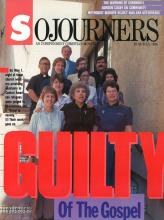Throughout the long sanctuary trial, a black banner hung in the sanctuary movement's media office in downtown Tucson. "The Truth Will Set You Free," it said in big letters cut from colorful cloth. On the end of it someone had tacked a piece of computer paper with the handwritten word, "Eventually."
The humorous afterthought referred, no doubt, to the seemingly endless nature of the trial. But now, after eight sanctuary workers have been found guilty by a federal jury and face possible prison terms of up to 25 years, the one-word footnote offers bittersweet comfort and profound theological insight.
For in the end, the sanctuary trial was less about the issues of sanctuary than it was about control of the truth. It had less to do with U.S. immigration law than it did with selective prosecution and selective presentation of evidence and law. It was more about faith than about crime. It represented injustice rather than justice. And the trial was not so much about conditions of violence and oppression in Central America as it was about the grim condition of relations between the U.S. government and those persons and groups that oppose its domestic and foreign policies.
The guilty verdict was not merely a reflection of the blatant bias of U.S. District Judge Earl H. Carroll, the corruption of government informant Jesus Cruz, the ruthless and shameless pursuit of convictions by Immigration and Naturalization Service investigator James Rayburn and prosecutor Donald M. Reno Jr., or even the conclusion of 12 jurors, but rather the policies and decisions of larger governmental bodies and more powerful government officials. The investigation of the sanctuary movement was ordered, after all, by top immigration officials in Washington intent on silencing the truth about U.S. policy in Central America.
Read the Full Article
